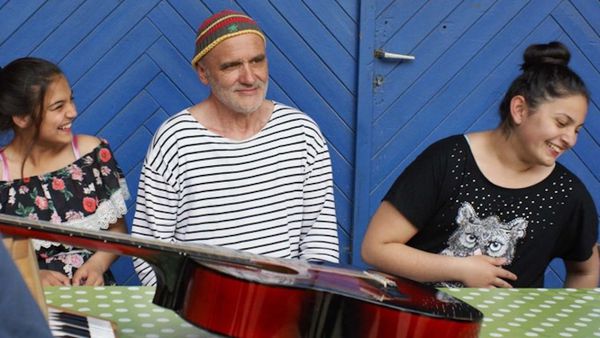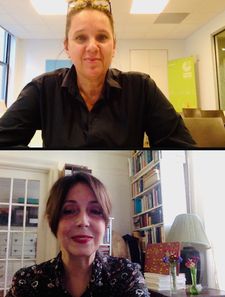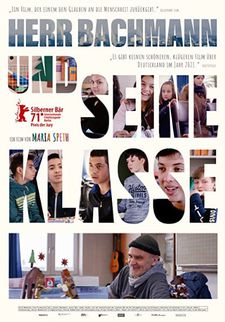 |
| Mr. Bachmann with Stefani (aka Stefi) and Ilknur in Maria Speth’s multiple award-winning Mr. Bachmann And His Class (Herr Bachmann Und Seine Klasse) Photo: Madonnen Film |
Mr. Bachmann And His Class (Herr Bachmann Und Seine Klasse), winner of the Silver Bear Jury Prize and Audience Award at this year’s Berlin International Film Festival, and Bester Dokumentarfilm at the German Film Awards is Maria Speth’s astounding vérité documentary on how a really good teacher can be life-changing, for an individual student, for a community, for the world. The film, co-presented by the German Film Office, is also a highlight in the 12th edition of DOC NYC, screening in the Winner’s Circle programme.
 |
| Maria Speth at Goethe-Institut in New York with Anne-Katrin Titze: “Mr. Bachmann and his particular teaching style really helped us to find a place in the classroom and be integrated.” |
Dieter Bachmann knows what is at stake for his 6th grade class, which is made up mainly of immigrant children, who are still more or less struggling with the German language. The kinds of schools they will attend the following year will determine their future. He uses his juggling skills, the students’ musical talent, a sculptor friend’s expertise, and a very open ear for the manifold problems they have to help as best he can. By taking into account their varying hardships and his own life experience, Mr. Bachmann tries to do justice and give courage to push forward in a world that has far too hard a time of celebrating diversity.
The film, co-written by Speth with her cinematographer Reinhold Vorschneider, drops us into the middle of nowhere in Hesse, Germany. The town is Stadtallendorf, close to Marburg, where the Brothers Grimm studied Law and began to be interested in collecting folktales. The town is the location of an armament facility which flourished during the Third Reich. To this day, the flat-roofed factory buildings are disguised by trees, which kept Allied bombers at bay. After the Second World War, the influx of foreign workers continued and the town has become a melting pot of sorts.
From Goethe-Institut in New York, Maria Speth joined me on Zoom for an in-depth conversation on Mr. Bachmann And His Class.
Anne-Katrin Titze: You manage to do two extraordinary things: You speak about the art and craft of teaching and we get insight that not very many films give. And you weave in German history beautifully. How did you work on structuring the film with these two elements?
Maria Speth: First of all, thank you, I’m happy that you see it like that. The starting point for me was this town [Stadtallendorf], this place, that only exists because the Nazis built it like that. This is a place in the middle of the landscape in the countryside in Germany, where you really don’t expect it.
 |
| Maria Speth: “We travelled seven times to Stadtallendorf and we spent thirty days in the classroom to shoot.” Photo: Madonnen Film |
AKT: You have the trees on top of the factory buildings, which are still there. It’s fascinating that there are still the elements of camouflage that were hiding the ammunition production.
MS: The town really is the first protagonist because of all these impressions that touched me so deeply. On the one hand you have the traditional 'Fachwerk' houses, and the Catholic church, the flat -roofed factory buildings that weren’t bombed, at the same time you have the mosque and the whole new infrastructure that’s in place because of all those people who came to the town. Then came the questions of how to combine the history of the town with the present into one film. The school was a natural choice, because everybody goes to school. It was the right choice to show the reality of this town.
AKT: How are they all doing now? Did you show them the film after it premiered in Berlin? How is Herr Bachmann dealing with retirement? Who did you reconnect with?
MS: It was very special because the film took four years to make. We shot in 2017 and it took me three years to edit. The pandemic happened, the Berlinale came and throughout all this time I couldn’t show the film to the protagonists. In May I finally managed to organise a screening following all safety protocols.
 |
| Maria Speth on Stadtallendorf, the starting point: “This is a place in the middle of the landscape in the countryside in Germany, where you really don’t expect it.” Photo: Madonnen Film |
Of course, in the meantime, the children had become young adults and I was kind of scared how it would be to meet them again. Mr. Bachmann, too, I had stayed in touch with him; we talked on the phone while I was editing. I hadn’t seen the children for so long but it turns out that their appearance changed a little bit but there was still the same energy in the room.
AKT: We get the impression in the film that he also learns so much from his students. The fact that he is also a juggler makes perfect sense. He juggles all these different personalities. How did you get them to ignore the camera so completely. Your presence became the most normal thing for them?
MS: In the beginning I tried to explain to them what it was that I wanted to do there. They didn’t really understand, because for them it’s just the most boring thing there is, going to school. I told them, no, for us it’s really interesting to see how you go to school, how you work. I tried to make it interesting for them by comparing it to a sort of photo album that they would have of themselves during this time, a record that other people don’t have.
 |
| Mr. Bachmann not only juggles tennis balls, he is adept at juggling the different personalities of his students Photo: Madonnen Film |
It was important to build a relationship with the children and in this Mr. Bachmann and his particular teaching style really helped us to find a place in the classroom and be integrated. Within this half year, between January and June 2017, we travelled seven times to Stadtallendorf and we spent 30 days in the classroom to shoot.
We didn’t shoot all the time but spent a lot of time with them, doing all sorts of things, we sang with them and ate with them. The talking was very important. It was interesting to see that these children weren’t compelled to put themselves in the spotlight or filming with their cell phones. They soon saw us as part of the furniture, really.
AKT: The song choices are interesting. From Smoke On The Water to He-Ho Spann Den Wagen An. It’s a wide spectrum and much of it is about learning language through singing. That’s his method?
MS: Exactly. This was just Mr. Bachmann’s way of doing things. For me it wasn’t easy sometimes. Of course, getting the rights for songs like Smoke On The Water is not always easy. I also found it important that he let the children bring in their own culture to the classroom, that Turkish children also sang their own songs and he integrated that into the class. This exchange that took place I found to be very special, that he also learned from the children.
 |
| Herr Bachmann Und Seine Klasse poster |
AKT: There’s a moment in the film that makes us look at the title in a different way. Herr Bachmann’s name is also very much connected to German history. His family changed their name, had to change their name during the Third Reich from the Polish Kowalski. The fact that it was Kowalski of all names, thinking about Tennessee Williams and Stanley Kowalski in A Streetcar Named Desire. Did you know that fact about him beforehand?
MS: I’ve known Dieter Bachmann privately for 30 years, because we’re friends, but that was also the first time that I heard about it. This made a lot of sense, his parents and grandparents were themselves immigrants and this is how he established a connection to the students. This really helped me with the narrative arch of the film.
AKT: When I spoke with DOC NYC Artistic Director Thom Powers, we touched on the DOC NYC U program that includes films from the different colleges in New York. In that context I brought up your film as one that I was very much looking forward to and it is a fantastic film!
MS: Thank you so much!
Mr. Bachmann And His Class is available now online through Sunday, November 28. The in-cinema screenings were on Wednesday, November 10 and Sunday, November 14.
DOC NYC 2021 in cinemas (IFC Center - SVA Theatre - Cinépolis Chelsea) runs from November 10 through November 18 with select films screening online in the US from November 19 through November 28.





















